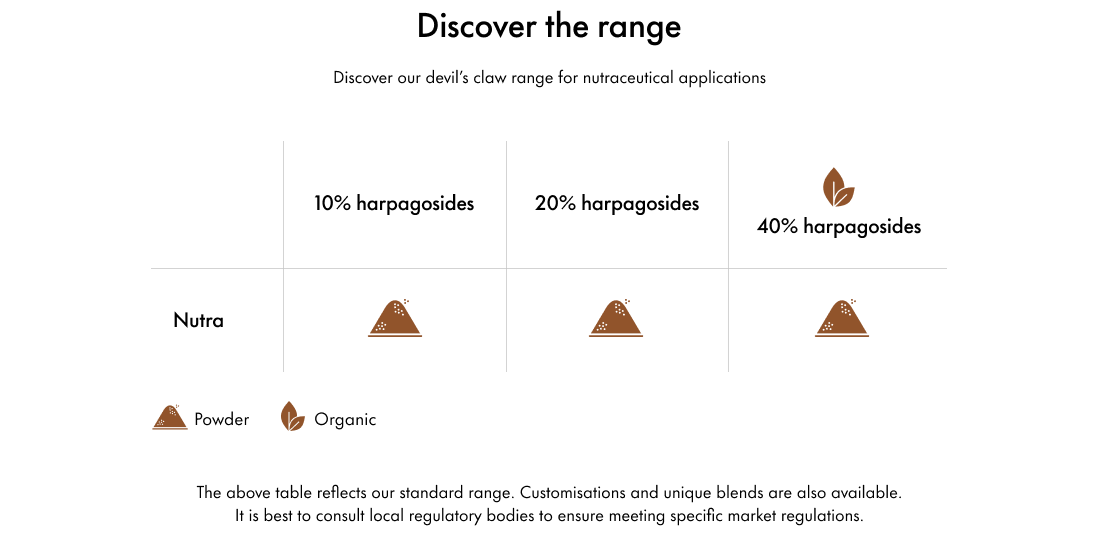




Joint support
several clinical studies show improvement in joint health
High level of actives
up to 40% harpagosides by UV and 20% harpagoside by HPLC
A long history of traditional use
known for centuries for its joint health benefits
Sustainably sourced
responsibly and reliably sourced with full traceability from Southern Africa
Low dose
only 1 capsule of 200mg of devil’s claw 40% harpagosides by UV

A number of clinical trials support the use of devil’s claw for its joint health supporting benefits. Devil’s claw has been shown to exhibit a soothing effect on joints. ² ³ ⁴
Devil’s claw contains several active compounds, of which harpagoside is the most researched. However, several_ in vitro_ studies have shown higher bioactivity of a complete extract as compared to isolated harpagoside and it is believed that the various bioactives contribute to the reported clinical effects in a synergistic manner. Its benefits are attributed to its ability to suppress the release of certain cytokines. ⁷ ⁸

At Givaudan, we are committed to sourcing all materials and services in a way that protects both people and the environment by 2030. In 2021, we joined and are still currently contributing to a project, co-financed by BMZ-German Development Cooperation (GIZ): BioInnovation Africa programme (BIA II), with the Namibian devil’s claw exporters association to make sure the wild collection of devil’s claw is carried out sustainably for both people and the environment.
To do so, during the first phase of the project, GACP+ guidelines were developed (Good Agricultural Practices and Collection practices in addition to Access & Benefit Sharing compliance, the “+”). These guidelines formalised the good practices to be followed by devil’s claw harvesting communities and promoted and monitored by the main four exporters of Namibia. Key requirements such as traceability to collector, resource preservation practices and respect of re-growth periods between harvests, as well as the compliance with applicable regulations regarding permits and agreements between collectors, traditional communities and exporters, are laid out in these guidelines, which are now being tested during phase two of the project.
The quality of the roots collected is enhanced thanks to these best-in-class harvesting and post harvesting practices. In addition, the project ensures that our supply chains are fully compliant with the applicable Access and Benefit Sharing (ABS) regulations in place in Namibia.
The alignment, endorsement and implementation of these guidelines by the four main exporters of devil’s claw in Namibia is a key milestone for the sector to speak a common voice and ensure that ethical sourcing requirements are met, despite the complexity of the supply chain.



























Generally considered healthier and more nutritious than the other main cereals, oats offer a full range of benefits in a single ingredient. OatWell™ can be provided in three different concentrations of beta-glucans, all delivering both soluble and insoluble fibres, along with an average of 21% - 23% protein.
OatWell™ uses a unique production process to fractionate the oat kernel into three product lines: beta-glucan products, oat flours, and oat oils. Our production process preserves the native structure of oat beta-glucans, retaining their high molecular weight during fractionation into oat brans with a high amount of beta-glucans.


The molecular weight of oat beta-glucan is essential to delivering health benefits. OatWell™'s beta-glucan has a very high molecular weight (2000-2500 kDa as naturally found in oats), which contributes to its unique viscosity and thickening properties. This viscosity has an important impact on physiological functions, such as reducing blood cholesterol levels, moderating blood glucose and insulin levels, and potentially benefiting satiety.
Benefits of OatWell’s high molecular weight:







The prebiotic effects of oat bran fibre have been validated through years of research. In a review by Malkki and Virtanen, they cite: “in the large bowel, soluble dietary fibre increases the fermentation activity, especially production of butyric acid, enhances growth and colonisation of some probiotic bacterial strains, increases production of microbial mass and thereby aids the removal of nitrogen via faeces. It also increases wet weight of stools, thereby alleviating constipation”.²¹
Research conducted on oat beta-glucan demonstrates that it meets three important criteria, confirming its status as a prebiotic fibre:¹ ²




